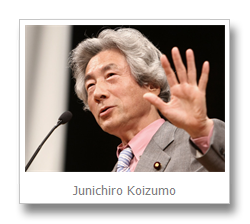Junichiro Koizumi was prime minister of Japan for six years, from 2001 to 2006. At that time, he was a booster of nuclear energy. Since he retired from politics, he has not maintained a public profile, but remains a highly respected figure – maybe because the Japanese public knows him best, as no prime minister since 2006 has been able to hold on to the job for more than a year or so.
So when Koizumi decides to say something, it gets attention:
In a recent lecture meeting, Koizumi asked the government to put forth a zero nuclear energy policy by calling for establishment of “a recycling society based on natural resources and that does not rely on nuclear power generation.” Koizumi said his view on this matter changed after the Great East Japan Earthquake.
The Great East Japan earthquake (and associated tsunami)precipitated the accident at Fukushima Daiichi. The strong public opinion to end nuclear energy has softened considerably and the current government has decided to restart the facilities. In fact, the election that brought the Liberal Democrats to power was considered a kind of referendum on nuclear energy –at first – but the subject barely figured into the campaign.
So I was curious about the response to Koizumi’s comments. It’s hard to measure the impact of retired politicians in this country much less another one, so there is an element of mystery here.
So, from the Yomiuri Shimbun, Japan’s national paper, an editorial:
Koizumi said finding substitute energy sources for nuclear power would “certainly be worked out by wise people.” We think this statement is overly optimistic and irresponsible.
Thermal power generation is currently filling the shortfall created by the loss of nuclear power generation. As a result, utility bills continue to rise due to higher fuel import costs. If this situation goes unchecked, the impact on household budgets and economic activity will be significant.
Thermal power generation is a major cause of accelerated global warming because it discharges a huge amount of carbon dioxide.
Renewable energy sources don’t get a very good reading, either:
Renewable energy sources that utilize sunlight and wind have the disadvantage of being affected by weather conditions. As such, there is no prospect that they will become principal power sources. It is necessary to seek a balanced composition of electricity sources in which nuclear and thermal power account for the lion’s share.
There’s more along these lines, too. I can’t say whether the Yomiuri Shimbun considers Koizumi’s comments a rear-guard action, whether the paper has an editorial distaste for Koizumi in general or it’s all just a consequence of fading opposition to Japanese use of nuclear energy. Maybe some of each.
It is unclear how big a lift, if any, the proclamation will give Japan’s antinuclear movement, which appeared to crest last year when tens of thousands of demonstrators gathered weekly outside the prime minister’s residence. While public opinion polls still show that more than half of Japanese oppose restarting the nation’s idled nuclear plants, the protests have dwindled to a few dozen die-hards.
There is an editorial in the The Daily Mainichi that takes Koizumi’s comments quite seriously and largely agrees with him, but it acknowledges that “It remains to be seen whether Koizumi will take political action to seek to rid Japan of all nuclear reactors…”. It remains to be seen. So, let’s see what happens.
---
Koizumi’s son, Shinjiro Koizumi, considered a political comer in the Liberal Democrat party, is sympathetic to his father’s view, but is still a working politician, so he’s a little more circumspect in his own response:
"There is continuing concern that it may be inappropriate (to maintain or further increase dependency on nuclear power) without debate," Koizumi added. "Because the economy is now apparently in the process of recovery, people are keeping silent."
That doesn’t seem wholly logical, but it does the job of responding without stating a real view. Koizumi thinks the Liberal Democrats should take a more serious look at renewable energy sources, which it has already proposed doing, while keeping his options open on nuclear energy. That’s not the same as stating out-and-out opposition as his father does but he also does not refute his father, either, which is good both personally and politically.
The younger Koizumi’s comments convince me more that nuclear energy has moved from pariah in Japan to prodigal child.

Comments
The ocean produced methanol could then be transported by tankers back to coastal methanol electric power plants on Japan for electricity production. The imported methanol could also be easily converted into gasoline for automobiles.
And if the Japanese reactors start to produce more methanol than they need domestically, they can then start to export nuclear produced methanol to other countries as a carbon neutral fuel.
Marcel